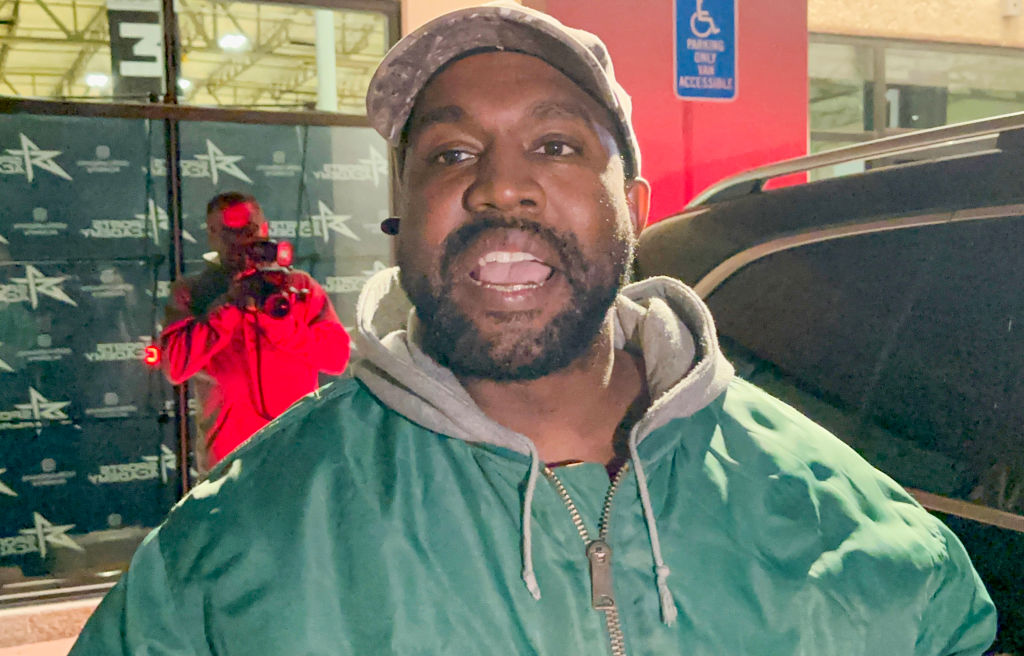Every so often, when The Dispatch’s virtual “watercooler” (that’s the actual name of one of our Slack channels) gets a little too focused on some goings-on on the social media platform that we all love to hate and yet still use, someone will pipe up, “Twitter is not the real world.” And it’s true: Platforms like Snapchat and TikTok have many more users than Twitter. But while Snapchat rarely makes the news and TikTok grabs headlines mostly for people doing dumb challenges like defacing school bathrooms or cooking Nyquil chicken, you don’t need a Twitter account to know how much it can influence our discourse.
We try to avoid a lot of the noise—we rarely wrote about Donald Trump tweets when he was active on the platform, for example. But sometimes, it’s unavoidable. Sometimes, Twitter either is the story or is where the biggest stories play out. This, dear readers, was one of those weeks.
Conspiracy theorist Alex Jones has a sizable enough audience for his show through his website InfoWars, but it was on Twitter where many of us watched in horror as Kanye West, wearing a mask that covered his entire head, responded to a softball comment from Jones—“You’re not Hitler. You’re not a Nazi. You don’t deserve to be called that and demonized.”—with an “Akshualllllllly …” that almost broke the internet. “Well, I see good things about Hitler also,” West (or Ye, as he goes by these days) said.
What’s funny (but not in a haha way) was that Nick had been planning to write a Boiling Frogs about Ye even before that storm broke, namely in terms of an October tweet from the account of the Republicans on the House Judiciary Committee that read simply “Kanye. Elon. Trump.” (A tweet that had aged poorly even before Ye’s Alex Jones meltdown.) The tweet was finally deleted but as Nick notes, “It’ll remain a fascinating time capsule from the fall of 2022 about how three very different folk heroes to populist conservatives repeatedly stepped on their own schlongs professionally.”
He notes what else they have in common: “All three have changed the world to various degrees. Go figure that each might believe he can change the world again by convincing it to accept ‘the truth’ about his particular hobby horse. For Kanye, the hobby horse is Jewish cultural power. For Trump, it’s 2020. For Elon, it’s the ‘woke mind virus’ on Twitter destroying free speech in the West.”
As for Kanye’s “hobby horse,” you should not miss Jonah’s G-File on the sheer stupidity of conspiracy theories about how Jewish people control the media or run the world. Or even the sheer stupidity of conspiracy theories in general, which he notes are especially attractive to losers: “Admitting that you failed because you weren’t good enough … is hard. But if you failed because the lizard people, the billionaires, or the bagel-snarfing Rothschilds conspired against you, that makes you not only a Very Important Person, but a kind of heroic martyr.”
But back to Elon. David has some thoughts in French Press. Musk spends a lot of time on his newly acquired social media platform discussing the importance of free speech, but he’s got an … interesting … definition. He’s been railing against Apple, complaining that the company has cut its advertising on the site and that it has threatened to pull the Twitter app from the App Store. David reminds Elon, and everyone, that Apple has its own free speech rights and that choosing where to advertise or which products to offer are part of that. He also has some thoughts about Apple, because it was just that kind of week.
So you can see why we try to avoid Twitter. Our mission is to be sober and responsible and improve the state of things, and Twitter elevates people who want to do the opposite. Its owner treats “free speech” as a cause without demonstrating that he understands the concept. It’s often in our interest to ignore Twitter shenanigans. Trust us, you don’t need to know our take on every utterance by Marjorie Taylor Greene or Jim Jordan or Matt Gaetz—or Alexandria Ocasio-Cortez or Elizabeth Warren, for that matter. But as much as “Twitter is not the real world,” there are times it spills over into it, and that spillage requires a sober response. That is what we offered this week, and we hope it will add to your understanding and perspective while saving you the trouble of watching it firsthand.
Now, we also had a bunch of other stuff this week you shouldn’t miss. Enjoy, and thanks for reading.
What to make of the 2022 midterms? There was plenty of talk about why the expected “red wave” never materialized for the GOP. Some focused on money or turnout, some on factors like abortion or Donald Trump. Yuval Levin argues that the election was a vote of no confidence—but not just for the GOP: ”Maybe voters didn’t choose change in this election because they weren’t actually offered change, but the very same options they faced and turned down last time.” He highlights how the House is going through an era of narrow majorities for both parties and he notes the factors that hurt the GOP in this particular election—namely abortion and the failure of Donald Trump’s preferred candidates. And he predicts the trends won’t change—unless the parties do: “There is reason to think we will only keep seeing such votes of no confidence as long as the parties offer voters the same choice between a repugnant Trumpism and a rabid cultural progressivism.”
What do Stewart Rhodes and Elon Musk have in common? On the surface, not much. Rhodes, who founded the Oath Keepers, was just convicted of seditious conspiracy for his role in the January 6 riot at the Capitol. Elon Musk is the world’s wealthiest man and the new owner of Twitter. But Nick traces their journeys and concludes they have one important similarity. Rhodes started out as a staunch libertarian who worked for Rand Paul after college and then founded a militia and began “calling for arming and training civilians to resist a violent power grab by the federal government.” So how did he end up supporting a strongman like Donald Trump? Nick calls it the “I got mine” principle. “Under a classically liberal ethic, the same rules apply to both sides; if you support the First Amendment, say, then you support a liberal’s right to free speech just as you support a conservative’s. Under a post-liberal ethic, there’s barely a pretense that fair play should be the goal,” he writes. Which brings us to Musk. Nick notes that at the same time Musk is making a lot of noise about free speech on Twitter, the company has suspended accounts of people critical of him and is doing nothing about Chinese spam bots crowding out tweets about China’s anti-lockdown protests. “There’s no country on Earth that stifles the speech of more human beings than China does, and to all appearances he’s unbothered by that. So what’s bothering him? Whose speech is he thinking of? Why, his own, of course,” Nick writes.
We’ve been hearing about Section 230 for years. Now it’s the Supreme Court’s turn. Section 230 of the 1996 Communications Decency Act is, as Andrew and Harvest note, “often described as a statutory pillar of the modern internet” for these 26 words: “No provider or user of an interactive computer service shall be treated as the publisher or speaker of any information provided by another information content provider.” What that means is that no company that hosts user content—from Facebook and Twitter to local news sites that allow readers to comment to Reddit—is liable for the content that those users post. Politicians from both parties have sought to limit those legal protections. This coming week the court will hear two cases to that end: Gonzalez v. Google and Twitter v. Taamneh, both filed by families of individuals who died in (separate) ISIS-linked terrorist attacks. Andrew and Harvest walk through the details of the cases. “If Gonzalez is the case where Section 230 liability protections are to be litigated, then, Taamneh—the case that so far has been litigated without any consideration of that shield—will concern what comes next,” they write.
And here’s the best of the rest:
- The 2024 election is here whether we are ready or not. In The Sweep, Sarah is here with a great tutorial on how candidates pick their campaign teams and what to look for over the next several months.
- Kevin McCarthy faces a few hurdles on his path to the speakership when the GOP takes control of the House in January, mostly recalcitrant members of his own caucus. But Stirewalt has two you might not have considered: the upcoming Georgia Senate runoff and the upcoming fight over raising the debt ceiling.
- How should U.S. officials react publicly to the protests in China? It’s a thornier question than you might think, one that Haley tackles in Uphill. She also weighs in on McCarthy’s travails, and Price checks in with an update on the January 6 committee. It’s a jam-packed edition!
- Why did Joe Biden react to the latest horrific mass shootings in Virginia and Colorado, which were carried out with a handgun and a homemade gun, by calling for an assault weapons ban? In Wanderland, Kevin argues it’s because the gun control battle isn’t about guns, but is just another front in the culture wars.
- And the pods: China, Iran, the gun debate, and Trump’s dinner with Nick Fuentes—The Dispatch Podcast covers it all, and still has time to discuss the World Cup. On Advisory Opinions, David and Sarah catch you up on all things Supreme Court related. On Good Faith, David and Curtis dive into the definitions of “progressive” and “conservative” from both political and theological points of view. And if the news has just been too much and you need a break, check out The Remnant, where Jonah talks to Dr. Alexandra Horowitz about dogs: Do they really like us, or have they just been playing us for millennia?









Please note that we at The Dispatch hold ourselves, our work, and our commenters to a higher standard than other places on the internet. We welcome comments that foster genuine debate or discussion—including comments critical of us or our work—but responses that include ad hominem attacks on fellow Dispatch members or are intended to stoke fear and anger may be moderated.
You are currently using a limited time guest pass and do not have access to commenting. Consider subscribing to join the conversation.
With your membership, you only have the ability to comment on The Morning Dispatch articles. Consider upgrading to join the conversation everywhere.